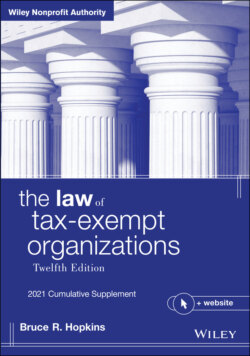Читать книгу The Law of Tax-Exempt Organizations, 2021 Cumulative Supplement - Bruce Hopkins R., Bruce R. Hopkins, David Middlebrook - Страница 38
ОглавлениеCHAPTER THIRTEEN Social Welfare Organizations
§ 13.1 Concept of Social Welfare (b) Benefits to Members
§ 13.3 Conduct of Business
p. 326, first complete paragraph. Insert as last sentence:
Organizations that primarily engage in gaming activities cannot qualify as exempt social welfare entities.11.1
§ 13.1 CONCEPT OF SOCIAL WELFARE
(b) Benefits to Members
p. 330, carryover paragraph. Insert as last sentence:
Likewise, an organization was denied recognition of exemption as a social welfare organization because its activities consisted of provision of maintenance services to its members, which were businesses owning lots in a commercial shopping property, in exchange for assessments.54.1
§ 13.3 CONDUCT OF BUSINESS
p. 336. Insert following carryover paragraph, before heading:
An organization was formed to operate a “holistic medicine establishment” selling medicinal marijuana products to patients with prescriptions from licensed physicians; it conducted a storefront business, being licensed by a state as a retailer of recreational‐use cannabis. The IRS denied recognition of exemption as a social welfare organization to this entity, on the ground that its primary activity was carrying on a business with the public in a manner similar to for‐profit organizations.113.1 The IRS applied the commerciality doctrine in reaching this conclusion, finding that the organization “use[s] promotional policies to enhance sales,” “advertises goods and services,” sets margins at a level that “enables [it] to replace merchandise inventory,” and “maintain[s] a retail outlet with hours of operation that are competitive with other retail establishments.”113.2 Notably, the IRS did not deploy the arguments that it uses in the charitable setting: namely, that the activity is illegal under federal law and is contrary to federal public policy.113.3
Notes
1 11.1 E.g., Priv. Ltr. Rul. 202015036.
2 54.1 Priv. Ltr. Rul. 201907013.
3 113.1 Priv. Ltr. Rul. 201941028.
4 113.2 See § 4.9(g).
5 113.3 See §§ 6.2(a), 6.3(i).
